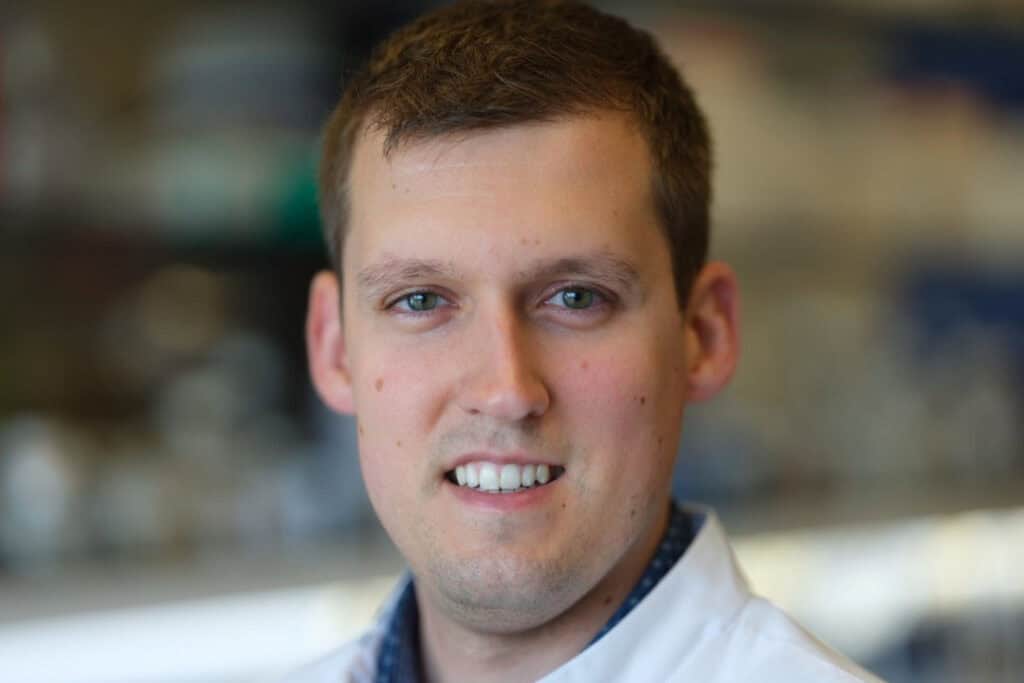Radboud University Medical Center, Netherlands

Dr Erik de Vrieze obtained his PhD from Radboud University, the Netherlands, where he worked with zebrafish models to test novel treatments for osteoporosis.
His desire to work with people inspired him to move to the Otorhinolaryngology (Ear, Nose and Throat) department of the Radboud University Medical Center. He is now a core member of the Dutch Hearing & Genes Centre of Expertise for hereditary hearing loss, where he has cultivated close collaborations between patients and academia.
More about Erik’s work
His research aims to understand the mechanisms that underlie inherited hearing loss, and to develop novel genetic treatments for these disorders. He is also a co-investigator on research projects focussed on Usher syndrome (deafblindness) which aim to develop antisense oligonucleotide (ASO)-based therapies (a type of genetic therapy).
Currently, he is investigating the potential of ASOs to prevent two types of inherited hearing loss (called DFNA9 and DFNA21). With this research, he aims to build a strong foundation to develop novel ASO-based treatments for many other types of hearing loss.
Development of a genetic therapy for DFNA9 adult-onset hearing loss
Read about Erik’s research projectErik’s approaches to hearing research
We are at the onset of an era where genetics and (personalised) genetic therapies will play a big role in healthcare. I believe our biggest challenge is to prepare our society and healthcare systems for a new way of diagnosing and treating hearing loss within the coming decade.
We will have to prepare and inform both people with hearing loss and healthcare professionals about the role of genetics in the care of hearing loss. For example, providing information about how valuable early diagnosis or recognition of hearing difficulties is, how genetics can be used to tailor the use of hearing aids and cochlear implants, and ultimately about the opportunities and limitations of new genetic treatments.
We often do not recognize the impact that hearing loss has on a person’s life. We (and I must confess I did too) easily underestimate how much we rely on hearing for almost everything that we do. Early in my research I came into contact with several people with hearing loss, which made me see and understand the barriers they can face in daily life, how this affects their job, social activities, family and quality of life. These people are an important source of inspiration for my research.
I hope that I can offer treatments to several large groups of people who have a form of inherited hearing loss that means they will lose their hearing at some point in their life, a form of early-onset adult hearing loss. Many of them have seen the effects of this in their family members. If treated early, the progression or development of hearing loss could be stopped or delayed in the younger generations of these families.
RNA therapeutics (genetic therapies based on RNA rather than DNA), including antisense oligonucleotides (ASOs), are rapidly becoming an established treatment strategy for many disorders. In hearing research, this technology has not yet received the attention that I believe it deserves, mainly because we do not yet know how to safely and effectively deliver ASOs to the human inner ear.
This project will provide essential insights into the required strategy to deliver ASOs to the inner ear. Furthermore, this project is funding the continued pre-clinical development of an ASO-based treatment for hearing loss type DFNA9. This funding is perfectly timed and crucial to introduce our field to the versatile treatment options that RNA therapeutics have to offer.